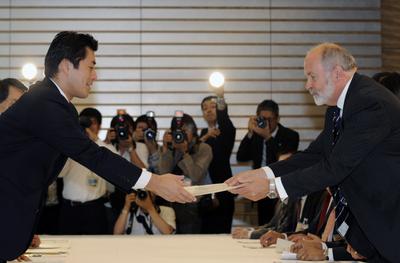First, advice should only be given when it is solicited by and in response to the needs of political leaders, as articulated by them. Frequently, the eagerness of experts to offer advice on a personal level to political leaders is seen merely an indication of eagerness to gain access to their patronage. Second, politicians actively seek the advice of experts mainly when they are out of power. Unlike politicians in power, who can draw on government administrators or policy experts, out-of-power politicians have limited access to information and analysis.
On special occasions, when politicians in power feel the need for the advice of outside experts, they will actively seek them out. There are at least two instances where non-governmental experts may play an advisory role to the government. The first is on various government commissions in which non-government experts are requested to serve as members. The second is where a non-government expert, or group of experts constituting an institution or a firm, is appointed as consultants to the government on specific subjects. These are instances of ‘solicited advice’.
Typically when government officials cannot devote adequate time and effort to a task which requires in-depth study and examination. Occasionally, government may establish a commission in response to the pressure of public opinion to act on a particular issue. The establishment of a commission or committee under these circumstances is often a technique for delaying action. Apart from assuaging pressure for action by demonstrating a seriousness of purpose on the part of the government, such commissions can provide a ‘berth’ or recognition for the past services or the loyalty of experts, who are often aspirants for assignments in the government but fail to get one due to the presence of competing candidates.
In cases where the government is seriously interested in a thorough examination of a policy issue, it is necessary to elicit a variety of opinions from experts. It is important to ensure that the experts appointed to such commissions not only possess the relevant technical competencies, but also represent, as a group, a diversity of views. This diversity must include views which do not necessarily agree with the economic and political approaches of the government of the day. When such a commission comes out with a consensus report, the acceptability of its recommendations is greatly enhanced. If there are significant differences of opinion, the commission needs to allow the dissenting views to be recorded in the report. Additionally, individual members should be allowed to express their views in public after the commission’s report is published.
Apart from solicited advice or advice actively sought by politicians, experts may provide advice on public policy issues in the public domain. They can express their views in the public media, both printed and electronic, as well as workshops or seminars, which are important venues for the public expression of experts’ views and opinions on policy issues.
A definitive answer as to when the public expression of expert views through the above avenues affects public policy is not possible. The occasions on which such views impact policies may be quite random. It could be by luck or the result of a confluence of events. It may be that, at the time such expert views are expressed in the public domain, policymakers are seriously engaged in the formulation of relevant policies and are thus more influenced by them than they otherwise would be.
In this context, expert views are more likely to influence policy if, one, there is a significant portion of the educated public interested in public policy issues and, two, they are interested in concerted or collective action to exercise pressure on policymakers. The impact of expert views is greater on policies and programs if the various civil society groups and NGOs involved incorporate expert views and suggestions into their work program and strive to mobilise public opinion on that basis.
For policy advice from outsiders to be effective, government institutions must be manned by well-qualified experts who can analyse, evaluate and examine the outsider’s proposals and their suitability or feasibility in the context of the political and institutional constraints faced by the government of the day.
Wise governments encourage vigorous debate both within and outside the government between different points of view, as such debates help the government arrive at its own policy positions, and improve the efficacy of policy. Moreover, a wide-ranging participation in discussions and debates tend to enhance the legitimacy and the acceptability of government decisions.
In policymaking, there is nothing worse than a situation in which policymakers do not know what they do not know, or believe they know when in fact they do not know. As Keynes once said, policymakers who think they are pragmatic or practical, and hence denigrate the often theoretical arguments of experts, are unwitting ‘slaves of defunct theorists’ or, one may add, of populist views and convictions; they have not been exposed to recent developments in economic thinking or accumulated experience around the world and hence keep to their old views.
Nurul Islam is Research Fellow Emeritus at the International Food Policy Research Institute, Washington DC. He was previously the Assistant Director General of the Economic and Social Policy Department at the Food and Agricultural Organization of the United Nations, Deputy Chairman of the Bangladesh Planning Commission, Chairman of the Bangladesh Institute of Development Studies, Director of the Pakistan Institute of Development Economics, and Chairman of the Department of Economics at Dhaka University.

